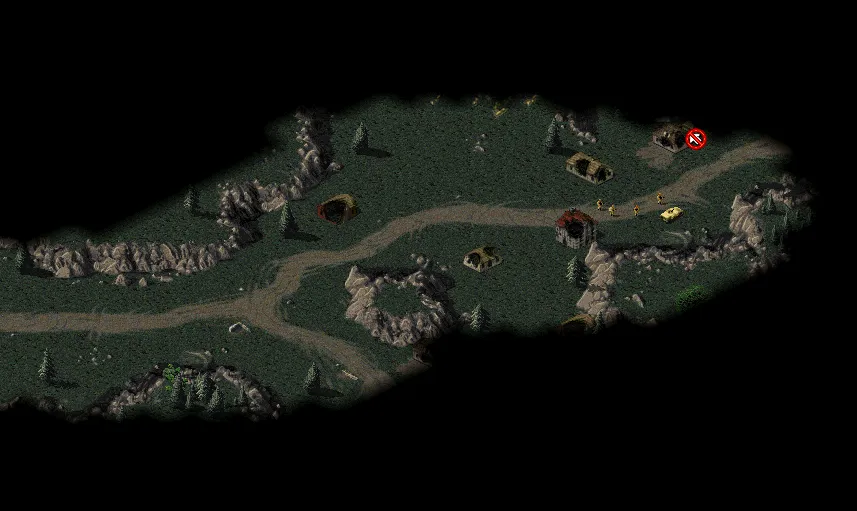The fog of war of company onboarding
Originally posted on Proof of Concept
When you start a new company, onboarding is a crucial phase to get right. The previous three times I’ve onboarded to a new company has been in a leadership role at a company already established. Onboarding is not simply following the artifact your new employer gives you. It’s a two-way street. The higher role you enter at a new company, the more important it is to onboard to the company well, because you only have one first impression with your new employer and colleagues.
The Fog of War
I describe onboarding as navigating the Fog of War—a game concept. The “Fog of War” in Real-Time Strategy (RTS) games is a game mechanic that conceals portions of the game map from the player until their units explore those areas. This creates an element of uncertainty and strategic depth, as players must scout and gather information about enemy positions and terrain. The concept was first introduced in the game Herzog Zwei, released in 1989. Notable examples of RTS games that have incorporated this mechanic include the Warcraft series, Starcraft, Age of Empires, and my favorite of all-time, Command & Conquer. These games use the Fog of War to enhance the strategic complexity by requiring players to balance exploration, defense, and offense without having complete information about their opponents’ actions.

The Fog of War is my metaphor to onboarding to a new company. You start at an empty point and the onboarding document the company gives you is the game instruction manual. It’s a great resource, but doesn’t have to be the only one you use to play the game. The natural action might be to clear out the entire fog of war first to get a full landscape of the map. Because you have not uncovered the Fog of War does not mean things aren’t happening. You have to quickly bridge the gap between expanding what you know and anticipating what might happen.
Capturing all the historical context is an impossible task
It’s important to build context as you a new company. I advise you to do the traditional listening tours, intro 1:1s, and scout the Fog of War to gain as much insight from the people who lived them directly. However, one mistake I see people make is trying to capture the historical context of the company before taking action. One of the reasons you were brought in is the ability to act quickly with precision.
You are unproven regardless of your experience
Regardless of the experience you bring, you’ll remain unproven until you gain your new team’s trust. Whether it’s a new sailor on a fishing vessel, free agent joining a new football club, or a squad member in the military, current teams already have a way of working and previous working experience together. Being the new factor on the team means it’s key to find ways to provide value and execute with the team.
My onboarding plan for every company
Even though most companies provide an onboarding doc when you join, you should come up with your own. It’s not because of lack of confidence that the company can do it, but based on your experience, there are likely things you know you want to learn.
First, my onboarding starts at the first interview. Interviewing at companies is not only a way for them to interview you for the role, but for you to interview if they are a good fit. From the first call with the recruiter and hiring manager, I’m already asking questions about the challenges and opportunities coming in. My favorite question is, “What am I getting myself into?” It’s good for both sides to have honest conversations and it results in better satisfaction on both ends. If a company doesn’t disclose any problems, I’m skeptical of why they need me to join.
Conduct desk research about the company. I will be explicit that I don’t like to reach out to people directly in respect of their time. You can learn quite a bit from online research about the company to map out where you might be impactful. A few examples of what you might research are:
- Looking up the backgrounds of the people you’d be working with (don’t be a creeper)
- Watch YouTube videos of recent company announcements, and my favorite, creators reviewing the product
- Sign up for the product and begin understanding the landscape; develop a POV of where it should go. It’s a red flag for me when interviewers don’t even try the product during their candidacy.
Once you join the company, speed run the Fog of War. Get a good sense of what’s important to learn without having it consume your first several weeks. It’s important to onboard well, but equally as important to make an impact. I often tell my team that I start with a lot of assumptions, which are not decisions, but a method to move quickly. However, I’ll refine the assumptions based on the context I learn, including chatting with them. As a new team member, it’s important to share with them what you’re thinking about or what your point of view is, even if you don’t have a definitive determination yet. You can always update your assumptions based on new information.
To understand the boundaries quickly, I navigate the most important parts of the Fog of War seeking:
- The biggest areas of risk that need to be acted on immediately.
- People and stakeholders not on the onboarding doc handed to you to be familiar with.
- Meeting with people who understand the state of the business. Going directly to the CEO, founders, or execs might not be possible due to their schedule. Seek the data scientists, finance folks, and operations.
- Advocates and skeptics of your org and what you might need to address

There is likely a reason you were hired and it’s important to emphasize your external value immediately. We might feel cognizant of not wanting to step on toes and assimilate to the new company. However, you were hired to bring your external skill and perspective. Don’t forget that. Since it’s impossible to turn yourself into a tenured employee of the new company, you gain wins by bringing your external value to them immediately. This might be the institutional knowledge you have in an industry or craft. It could be your skill in building teams. Identify that and push hard in those areas.
Successful onboarding is the company’s onboarding + yours
To be abundantly clear, the onboarding your company provides is extremely valuable. Remember to think of it as the game instruction manual. Bring your own knowledge and experience to the table annd onboard yourself. For certain roles or company types, the ability to onboard fast and act is key. To recap, my onboarding method is:
- Begin onboarding during the interview process
- Speed run the Fog of War to build momentum
- Be loud and clear about what external value you bring
You only onboard once (YOOO?). The next time you join a company, design your own onboarding to navigate the Fog of War.